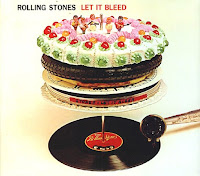Let It Bleed

What a year 1969 was for rock and roll! There was The Beatles' Abbey Road, the Who's Tommy, the first two albums by Led Zeppelin, plus debuts by Chicago and King Crimson, and the concert of the millennium, Woodstock. In November of that year the Rolling Stones released one of their finest records, Let It Bleed.
This was the second in the Stones brilliant four-album run, preceded by Beggar's Banquet and followed by Exile on Main Street and Stickyfingers. It features the Stones at both their most malevolently sensual and boyishly playful, and begins and ends with two of the most anthemic songs of the decade.
"Gimme Shelter" kicks things off, and was the flip-side of the sunny hippie songs of the era, as well as a foretelling of the bad vibes that would doom the movement, typified by the killing at the Stones concert at Altamont. "Rape, murder, it's just a shot away," the band sang (including a fierce vocal by guest vocalist Merry Clayton, that can still raise goosebumps forty years later). I try to imagine how an unsuspecting listener could put this on their turntable and be greeted with a despairing prediction of the apocalypse. Perhaps the best response would be to reach for one's bong.
The record closes with the more hopeful "You Can't Always Get What You Want," with the bad boys or rock employing a boys choir. The verses are inscrutable, though doing some reading I learned that "Mr. Jimmy" refers not to Mr. Hendrix but to Jimmy Miller, the song's producer (and drummer on the track), and that "he said one word to me and that was 'dead'" is not a statement about mortality--"dead" was lingo roughly equating with "neato."
Though that last song has a shoulder-shrugging call for acceptance, much like the Beatles "Let It Be," (there is an assumption that the album's title was a wink at the Beatles, even though this album came out before the Let It Be album, the Beatles song was already known) most of the songs have a poorly hidden reference to sex, drugs and murder. Midnight Rambler includes actual testimony from the Boston Strangler, and despite it's peppy harmonica has some pretty fucked-up lyrics. Live With Me seems to be about a guy who wants a woman to move in with him so she can clean up after him, and the title track includes the line "You can cum on me," which is pretty daring for 1969.
The record also includes the finger-snappingly cool Monkey Man, Keith Richards' first solo lead vocal, You Got the Silver, and the gorgeous cover of Robert Johnson's Love in Vain, another example of my dictum that any song about trains is a good one.
Let It Bleed is also a transitional record, as Brian Jones was booted from the band (he would then die on June 23, 1969). He only plays on two tracks, and this would be the debut of new guitarist Mick Taylor.
Since then, it has become a hallowed object in the classic rock pantheon, voted number 32 on Rolling Stone's 500 Greatest Albums of All Time and number 28 on Q Magazine's 100 Greatest British Albums Ever. Given the indelible power of the opening and closing numbers, I would rank it even higher.


Comments
Post a Comment